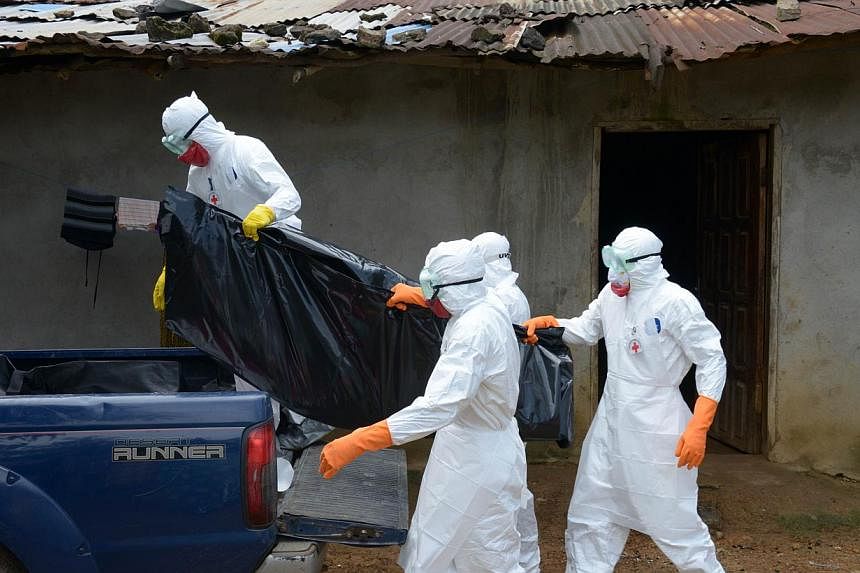CONAKRY (AFP) - From Guinea's forests to Nigeria's oil hub, here are the main developments since the haemorrhagic fever Ebola emerged earlier this year in west Africa, spreading to five countries in eight months.
The epidemic, the worst-ever since the virus was first identified in 1976, has left 1,841 dead in the three hardest-hit nations, according to the World Health Organisation (WHO).
More deaths have been reported in Nigeria, and another strain has also been identified separately in central Africa, where the Democratic Republic of Congo (DRC) has announced its own hotspot.
March 24: Officials from Guinea's Health Ministry and the WHO say that from January to March 23 the country has recorded 87 suspected cases of viral haemorrhagic fever, including 61 deaths.
Scientists studying samples in the French city of Lyon confirm it is Ebola. On the 27th it spreads to Guinea's capital Conakry.
March 31: Liberia confirms two cases of the virus.
April 5: West African countries mobilise, with medical teams deployed at Conakry airport.
May 26: Sierra Leone confirms its first fatality.
June 21: The WHO says the rapid spread of Ebola in the countries concerned has occurred in part because containment efforts have been too relaxed.
July 25: The virus spreads to Nigeria, as a Liberian-American dies in quarantine in Lagos. The country places its ports and airports on alert.
Aug 5: The World Bank earmarks up to US$200 million (S$250.3 million) to help contain Ebola.
Aug 8: The WHO declares the Ebola epidemic a "public health emergency of international concern".
Nigeria follows Liberia and Sierra Leone in declaring a national emergency.
Aug 12: The WHO authorises the use of experimental drugs in the fight against Ebola, after an ethical debate.
Aug 13: Liberia receives doses of an experimental Ebola treatment called ZMapp, which has shown positive early results.
Guinea declares a "health emergency".
Aug 15: The WHO says the magnitude of the Ebola epidemic in west Africa has been "vastly" underestimated.
Aug 18-22: Several countries close their borders with the affected countries.
Liberia imposes a nighttime curfew and quarantines two affected neighbourhoods.
Aug 27: The last major airlines still operating in Freetown, Monrovia and Conakry suspend their flights.
Aug 28: Nigeria announces that the virus has reached its oil-producing hub, Port Harcourt.
Aug 29: Senegal confirms its first case, as a young Guinean tests positive.
Sept 2: Doctors Without Borders says the world is "losing the battle" to contain Ebola.
An outbreak of a separate strain in DRCongo has killed 31 people, the WHO says.
Labour shortages and disrupted cross-border trade caused by the Ebola outbreak have sparked "grave food security concerns", the UN says.
Sept 3: The epidemic is spreading faster and global experts believe that six to nine months will be needed to stem it, the WHO says.
Sept 4: The WHO puts the death toll at 1,841 out of a total of 3,685 cases in Guinea, Sierra Leone and Liberia. In addition, there are seven known deaths in Nigeria and 31 in the unrelated DRCongo outbreak.
Experts propose the rapid development of eight experimental treatments and two vaccines for Ebola. Distribution would still take several months however.
The United States offers an additional US$75 million to buy beds and bolster Ebola treatment centres.
Sept 5: The European Union announces 140 million euros (S$227 million) in aid to Ebola-hit west Africa.

